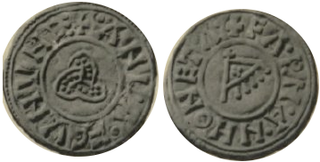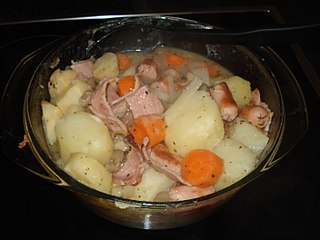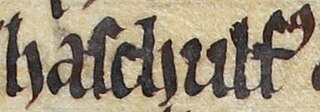
Hiberno-English or Irish English, also formerly Anglo-Irish, is the set of English dialects native to the island of Ireland.

The Norsemen were a North Germanic ethnolinguistic group of the Early Middle Ages, during which they spoke the Old Norse language. The language belongs to the North Germanic branch of the Indo-European languages and is the predecessor of the modern Germanic languages of Scandinavia. During the late eighth century, Scandinavians embarked on a large-scale expansion in all directions, giving rise to the Viking Age. In English-language scholarship since the 19th century, Norse seafaring traders, settlers and warriors have commonly been referred to as Vikings. Historians of Anglo-Saxon England distinguish between Norse Vikings (Norsemen) from Norway who mainly invaded and occupied the islands north and north-west of Britain, Ireland and western Britain, and Danish Vikings, who principally invaded and occupied eastern Britain.

Amlaíb mac Sitric, commonly called Amlaíb Cuarán, was a 10th-century Norse-Gael who was King of Northumbria and Dublin. His byname, cuarán, is usually translated as "sandal". His name appears in a variety of anglicized forms, including Olaf Cuaran, Anlaf Sihtricson and Olaf Sihtricson, particularly in relation to his short-lived rule in York. He was the last of the Uí Ímair to play a major part in the politics of the British Isles.

West Brit, an abbreviation of West Briton, is a derogatory term for an Irish person who is perceived as Anglophilic in matters of culture or politics. West Britain is a description of Ireland emphasising it as under British influence.

Dubliners is a collection of fifteen short stories by James Joyce, first published in 1914. It presents a naturalistic depiction of Irish middle class life in and around Dublin in the early years of the 20th century.

The Dubliners were an Irish folk band founded in Dublin in 1962 as The Ronnie Drew Ballad Group, named after its founding member; they subsequently renamed themselves The Dubliners. The line-up saw many changes in personnel over their fifty-year career, but the group's success was centred on lead singers Luke Kelly and Ronnie Drew. The band garnered international success with their lively Irish folk songs, traditional street ballads and instrumentals. The band were regulars on the folk scenes in both Dublin and London in the early 1960s, and were signed to the Major Minor label in 1965 after backing from Dominic Behan who was paid by Major-Minor to work with the Dubliners and help them to build a better act fit for larger concert hall venues. The Dubliners worked with Behan regularly between 1965 and 1966; Behan wrote numerous songs for this act including the song McAlpine's Fusiliers created specifically to showcase Ronnie Drew's gravel voice. They went on to receive extensive airplay on Radio Caroline which was part-owned by Phil Solomon CEO of Major Minor, and eventually appeared on Top of the Pops in 1967 with hits "Seven Drunken Nights" and "The Black Velvet Band". Often performing political songs considered controversial at the time, they drew criticism from some folk purists and Ireland's national broadcaster RTÉ had placed an unofficial ban on their music from 1967 to 1971. During this time the band's popularity began to spread across mainland Europe and they appeared on The Ed Sullivan Show in the United States. The group's success remained steady right through the 1970s and a number of collaborations with The Pogues in 1987 saw them enter the UK Singles Chart on another two occasions.

Coddle is an Irish dish which is often made to use up leftovers. It most commonly consists of layers of roughly sliced pork sausages and rashers with chunky potatoes, sliced onion, salt, pepper, and herbs. Traditionally, it can also include barley.
The Irish Literary Revival was a flowering of Irish literary talent in the late 19th and early 20th century. It includes works of poetry, music, art, and literature.

Rush, officially An Ros, is a small seaside commuter town in Fingal, Ireland. It was one of the few towns of the historic County Dublin. Rush lies on the Irish Sea coast, between Skerries and Lusk, and has a small harbour. It had a population at the 2022 census of 11,042.
"The Dead" is the final short story in the 1914 collection Dubliners by James Joyce. It is by far the longest story in the collection and, at 15,952 words, is almost long enough to be described as a novella. The story deals with themes of love and loss, as well as raising questions about the nature of the Irish identity.
Craic or crack is a term for news, gossip, fun, entertainment, and enjoyable conversation, particularly prominent in Ireland. It is often used with the definite article – the craic – as in the expression "What's the craic?". The word has an unusual history; the Scots and English crack was borrowed into Irish as craic in the mid-20th century and the Irish spelling was then reborrowed into English. Under either spelling, the term has attracted popularity and significance in Ireland.
Culchie is a pejorative term in Hiberno-English for someone from rural Ireland. The term usually has a pejorative meaning directed by urban Irish against rural Irish, but since the late 20th century, the term has also been reclaimed by some who are proud of their rural or small town origin. In Dublin, the term culchie is often used to describe someone from outside County Dublin, including commuter towns such as Maynooth. In Belfast, Northern Ireland, the term is used to refer to persons from outside of the city proper but not necessarily outside the Greater Belfast area. The etymology of the term is unclear.
Alan is a masculine given name in the English language. Its surname form is Aland.

The Norse–Gaels were a people of mixed Gaelic and Norse ancestry and culture. They emerged in the Viking Age, when Vikings who settled in Ireland and in Scotland became Gaelicised and intermarried with Gaels. The Norse–Gaels dominated much of the Irish Sea and Scottish Sea regions from the 9th to 12th centuries. They founded the Kingdom of the Isles, the Kingdom of Dublin, the Lordship of Galloway, and briefly ruled the Kingdom of York. The most powerful Norse–Gaelic dynasty were the Uí Ímair or House of Ivar.
Terence Dolan was an Irish lexicographer and radio personality. He was professor of Old and Middle English in the School of English and Drama at University College Dublin. He acted as the School's Research Co-ordinator, and was the director of the Hiberno-English Archive website. He appeared weekly on Seán Moncrieff's radio show (Mondays) on Newstalk 106. Podcasts of his appearances are available from Newstalk's website.

Ascall mac Ragnaill meic Torcaill, also known as Ascall Mac Torcaill, was the last Norse-Gaelic king of Dublin. He was a member of the Meic Torcaill, a Dublin family of significance since the early twelfth century.
In theater and music history, a burletta is a brief comic opera. In eighteenth-century Italy, a burletta was the comic intermezzo between the acts of an opera seria. The extended work Pergolesi's La serva padrona was also designated a "burletta" at its London premiere in 1758.
Shoneenism is a pejorative term, used in Ireland from at least the 18th century, to describe Irish people who are viewed as adhering to Anglophile snobbery. Some late 19th and early 20th century Irish nationalist writers, like D. P. Moran (1869–1936), used the term shoneen, alongside the term West Brit, to characterize those who displayed snobbery, admiration for England or mimicked the English nobility. A stereotypical shoneen also reputedly shows corresponding disdain for both Irish nationalism and the decolonisation of Irish culture, such as the Irish language revival, Modern literature in Irish, Gaelic games, and Irish traditional music.
Epiphany in literature refers generally to a visionary moment when a character has a sudden insight or realization that changes their understanding of themselves or their comprehension of the world. The term has a more specialized sense as a literary device distinct to modernist fiction. Author James Joyce first borrowed the religious term "Epiphany" and adopted it into a profane literary context in Stephen Hero (1904-1906), an early version of A Portrait of the Artist as a Young Man. In that manuscript, Stephen Daedalus defines epiphany as "a sudden spiritual manifestation, whether in the vulgarity of speech or of gesture or in a memorable phase of the mind itself." Stephen's epiphanies are moments of heightened poetic perception in the trivial aspects of everyday Dublin life, non-religious and non-mystical in nature. They become the basis of Stephen's theory of aesthetic perception as well as his writing. In similar terms, Joyce experimented with epiphany throughout his career, from the short stories he wrote between 1898 and 1904 which were central to his early work, to his late novel Finnegans Wake (1939). Scholars used Joyce's term to describe a common feature of the modernist novel, with authors as varied as Virginia Woolf, Marcel Proust, Ezra Pound, and Katherine Mansfield all featuring these sudden moments of vision as an aspect of the contemporary mind. Joycean or modernist epiphany has its roots in nineteenth-century lyric poetry, especially the Wordsworthian "spots of time," as well as the sudden spiritual insights that formed the basis of traditional spiritual autobiography. Philosopher Charles Taylor explains the rise of epiphany in modernist art as a reaction against the rise of a “commercial-industrial-capitalist society” during the early twentieth century.









